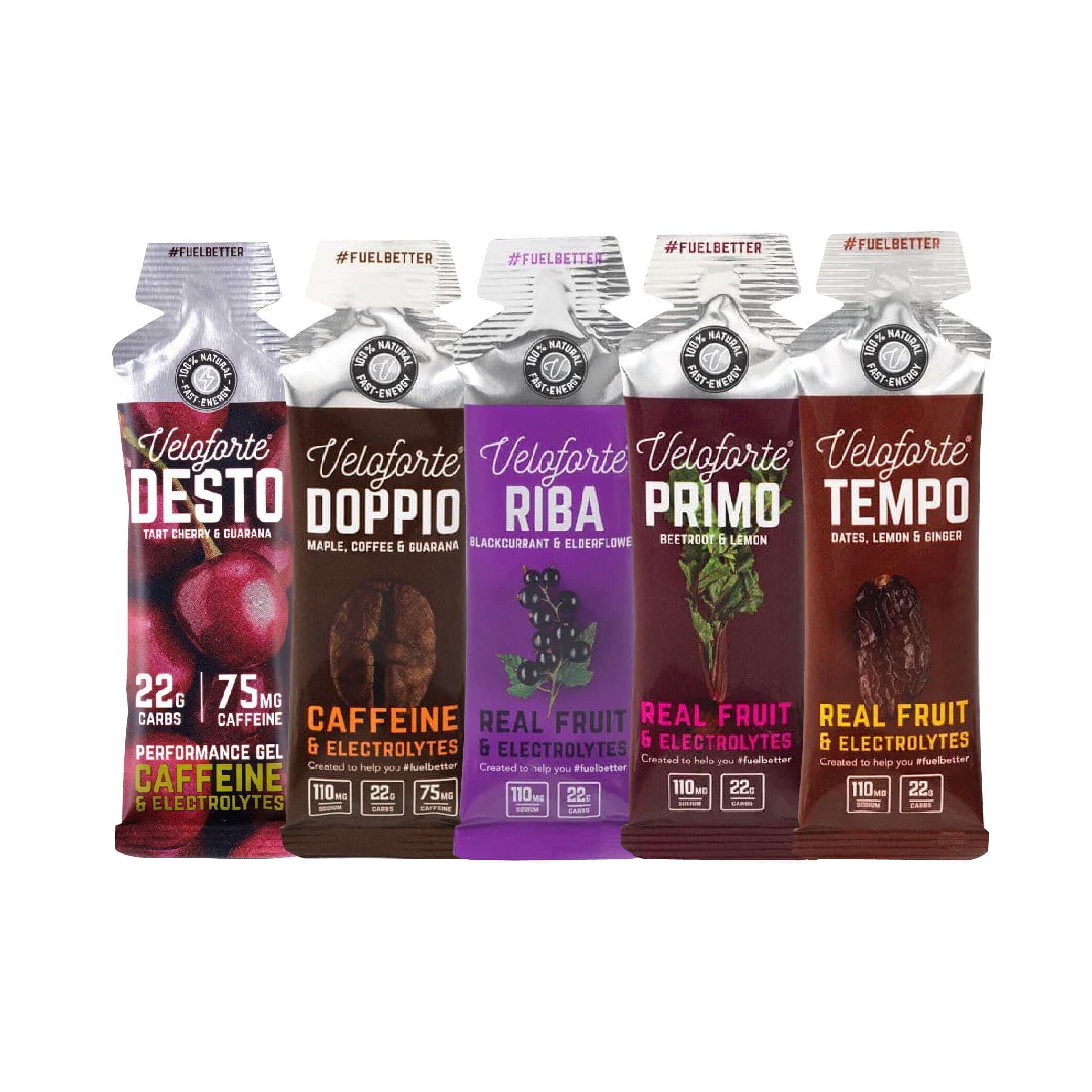Home>Misc>Featured>Why Do Endurance Athletes Need More Carbohydrates


Featured
Why Do Endurance Athletes Need More Carbohydrates
Modified: January 2, 2024
Discover why featured endurance athletes require increased carbohydrate intake for optimal performance and recovery. Learn how to fuel your body effectively.
Introduction
Endurance athletes, such as marathon runners, cyclists, and triathletes, rely heavily on their physical stamina and endurance to excel in their respective sports. These athletes push their bodies to the limit, demanding high levels of energy and strength. To meet these demands, nutrition plays a crucial role, and one nutrient that is particularly important for endurance athletes is carbohydrates.
Carbohydrates are the body’s primary source of energy, providing fuel for both the muscles and the brain. In endurance sports, where athletes must sustain prolonged periods of intense physical activity, carbohydrates become even more vital. Consuming an adequate amount of carbohydrates before, during, and after exercise can optimize an athlete’s performance, delay fatigue, and enhance recovery.
This article aims to delve into the significance of carbohydrates for endurance athletes, exploring their role in energy production, glycogen stores, performance, and the recommended carbohydrate intake for these athletes. We will also discuss the timing and types of carbohydrates for optimal results, as well as the benefits and risks of carbohydrate-loading and low carbohydrate diets for endurance performance.
Understanding the relationship between carbohydrates and endurance sports can help athletes make informed dietary choices and enhance their overall performance. So, let’s dig deeper into the world of carbohydrates and discover why endurance athletes need more of them.
Understanding Endurance Athletes
Endurance athletes are individuals who participate in sports or activities that require prolonged periods of physical exertion. These athletes engage in activities such as long-distance running, cycling, swimming, triathlons, and cross-country skiing, which demand high levels of cardiovascular fitness, muscular endurance, and mental stamina.
Unlike athletes in sports that are more focused on short bursts of intense activity, such as sprinting or weightlifting, endurance athletes undergo extended periods of sustained effort. As a result, their bodies have unique nutritional needs to support their demanding training and competition schedules.
Endurance athletes typically require a higher caloric intake due to the increased energy expenditure associated with their training and competitions. This additional energy is necessary to fuel their muscles, sustain prolonged efforts, and maintain overall performance.
In addition to the increased caloric needs, endurance athletes also require specific nutrients to support their training and optimize their performance. These include carbohydrates, proteins, fats, vitamins, and minerals. However, carbohydrates play a particularly crucial role in the diet of endurance athletes.
Understanding the physiology and nutritional requirements of endurance athletes is essential for designing effective and personalized dietary strategies. By tailoring their nutritional intake to meet their specific needs, these athletes can promote optimal performance, prevent fatigue, and enhance recovery.
Importance of Carbohydrates for Endurance Athletes
Carbohydrates are the primary source of energy for the body, making them crucial for the performance and well-being of endurance athletes. The body breaks down carbohydrates into glucose, which is then transported to the muscles and used as fuel during exercise.
For endurance athletes, who engage in prolonged and intense physical activity, having a sufficient supply of carbohydrates is vital. Carbohydrates not only provide energy during exercise but also help to preserve glycogen stores, delay fatigue, and improve overall performance.
Endurance activities deplete glycogen stores, which are the stored form of carbohydrates in the muscles and liver. Depleted glycogen stores can lead to decreased energy levels, muscle fatigue, and impaired performance. By consuming adequate amounts of carbohydrates, endurance athletes can replenish their glycogen stores and sustain their energy levels throughout their training and competitions.
Moreover, carbohydrates have a sparing effect on protein. When carbohydrates are not present in sufficient quantities, the body may use proteins as an alternative source of energy. This can lead to muscle breakdown and hinder muscle recovery. By consuming enough carbohydrates, endurance athletes can preserve their muscle mass and support proper recovery after intense workouts.
Carbohydrates also play a significant role in brain function. The brain relies on glucose as its main source of fuel, and during prolonged exercise, the depletion of glucose can impair cognitive function and mental focus. By maintaining adequate carbohydrate intake, endurance athletes can ensure optimal brain function and mental clarity during their workouts and competitions.
In addition to providing energy and preserving glycogen stores, carbohydrates contribute to the release of insulin, a hormone that helps transport nutrients, including amino acids, into the muscles. This can enhance muscle protein synthesis and repair, facilitating the recovery process after intense training sessions.
Given the critical role that carbohydrates play in fueling endurance activities and supporting overall performance, it is essential for endurance athletes to prioritize carbohydrates in their diet. By doing so, they can optimize their energy levels, delay muscle fatigue, improve brain function, preserve muscle mass, and enhance recovery.
Role of Carbohydrates in Energy Production
Carbohydrates play a fundamental role in energy production for endurance athletes. When consumed, carbohydrates are broken down into glucose, which is then utilized by the body as a primary source of fuel.
During exercise, the body requires a constant supply of energy to sustain muscle contractions and maintain performance. Carbohydrates provide a readily available source of glucose that can be rapidly converted into energy. This makes carbohydrates particularly important for athletes engaging in endurance activities that demand prolonged and continuous effort.
As the intensity and duration of exercise increase, the body relies more heavily on carbohydrates for energy production. When glycogen stores in the muscles and liver become depleted, glucose from carbohydrate sources can be quickly converted into energy through a process called glycolysis.
Glycolysis is the breakdown of glucose molecules into pyruvate, resulting in the production of ATP (adenosine triphosphate), the body’s primary energy currency. ATP provides the fuel necessary for muscle contractions and helps to power all cellular activity in the body.
For endurance athletes, maintaining optimal glycogen levels through adequate carbohydrate intake is crucial. Having sufficient glycogen stores allows the muscles to perform at their best and delays the onset of fatigue.
During prolonged exercise, carbohydrates become the predominant source of energy, especially during high-intensity efforts. Studies have shown that when athletes consume carbohydrates during exercise, they can sustain higher exercise intensities and maintain performance for longer durations compared to those who rely solely on endogenous glycogen stores.
In addition to serving as a direct fuel source, carbohydrates also play a role in preserving muscle glycogen. When carbohydrates are consumed during or immediately after exercise, glycogen synthesis is enhanced. This means that carbohydrates consumed post-exercise can help replenish glycogen stores more efficiently, facilitating the recovery process and preparing the body for subsequent bouts of exercise.
Overall, carbohydrates are a vital component of endurance athletes’ diets as they provide the necessary fuel for energy production during exercise. By ensuring adequate carbohydrate intake, athletes can optimize their energy levels, sustain high-intensity efforts, delay fatigue, and enhance their overall performance.
Glycogen Stores and Performance
Glycogen stores play a crucial role in the performance of endurance athletes. Glycogen is the stored form of carbohydrates in the muscles and liver, and it serves as an essential energy source during prolonged exercise.
Endurance activities deplete glycogen stores as the body taps into these reserves to meet the increased energy demands. As glycogen levels become depleted, athletes may experience a decline in performance, decreased energy levels, and increased fatigue.
Maintaining optimal glycogen levels is particularly important for endurance athletes as it can directly impact their ability to sustain high-intensity efforts and perform at their best.
Studies have shown that the depletion of muscle glycogen is closely associated with fatigue during endurance exercise. As glycogen stores diminish, the body must rely on other energy sources, such as fat, which requires more oxygen to be converted into energy. This shift to using fat as a primary energy source can impair exercise performance, especially during higher intensity efforts.
When glycogen stores are depleted, athletes often experience a phenomenon known as “hitting the wall” or “bonking.” This occurs when the body is unable to meet the energy demands of exercise due to low glycogen levels, leading to a sudden decline in performance, extreme fatigue, and a feeling of being physically depleted.
To prevent “hitting the wall” during long training sessions or competitions, endurance athletes must ensure that they have sufficient glycogen stores. This can be achieved through proper carbohydrate intake and strategic carbohydrate loading techniques.
Carbohydrate loading, also known as glycogen loading, involves consuming a high-carbohydrate diet in the days leading up to a long-distance event. By increasing carbohydrate intake, athletes can boost their glycogen stores above normal levels, providing a readily available energy source for the demanding endurance activity.
Research has shown that carbohydrate loading can significantly improve endurance performance by delaying fatigue and improving overall time to exhaustion. It allows athletes to maintain a higher intensity for a longer duration, resulting in better race times and improved athletic achievements.
In summary, the glycogen stores in the muscles and liver have a direct impact on the performance of endurance athletes. Ensuring optimal glycogen levels through proper carbohydrate intake and strategic carbohydrate loading techniques can help athletes sustain high-intensity efforts, delay fatigue, and improve overall performance.
Carbohydrate Recommendations for Endurance Athletes
Carbohydrate recommendations for endurance athletes are crucial to ensure an adequate supply of fuel for training, optimal performance, and efficient recovery. The exact carbohydrate needs may vary depending on the individual athlete’s training volume, intensity, body composition, and personal goals.
A widely accepted guideline for carbohydrate intake in endurance athletes is to aim for 6-10 grams of carbohydrates per kilogram of body weight per day. For example, a 70-kilogram (154-pound) athlete would consume between 420-700 grams of carbohydrates daily.
It is important to note that these recommendations are general guidelines, and individual athletes may require adjustments based on their specific needs and responses to different training loads.
Pre-training or pre-competition meals should provide a sufficient amount of carbohydrates to top off glycogen stores and provide energy. Ideally, these meals should be consumed 2-4 hours before exercise and consist of complex carbohydrates, such as whole grains, fruits, and vegetables, to provide a steady release of energy.
During long-duration training sessions or competitions lasting more than 60-90 minutes, the intake of carbohydrates is essential to maintain energy levels and delay fatigue. The general recommendation is to consume 30-60 grams of carbohydrates per hour, preferably in the form of easily digestible sources like sports drinks, gels, or energy bars.
Post-exercise nutrition plays a critical role in recovery and glycogen replenishment. Consuming carbohydrates shortly after exercise enhances glycogen synthesis and facilitates muscle recovery. Aim for a carbohydrate intake of 1-1.2 grams per kilogram of body weight within the first 30 minutes post-exercise, and repeat every 2 hours for up to 6 hours to restore glycogen stores.
It is important to note that individual preferences and tolerances should also be taken into account when determining carbohydrate intake. Some athletes may find specific foods or sports nutrition products more easily digestible or prefer certain sources of carbohydrates over others. Experimenting and finding what works best for each individual can optimize performance and ensure compliance with carbohydrate recommendations.
Lastly, it is crucial to work with a registered dietitian or sports nutritionist who can provide personalized guidance based on individual requirements, training goals, and nutritional preferences. These professionals can help athletes tailor their carbohydrate intake to optimize performance, promote recovery, and address any specific dietary concerns or limitations.
Timing and Types of Carbohydrates
Timing and types of carbohydrates are important considerations for endurance athletes to optimize their performance, energy levels, and recovery. In addition to meeting daily carbohydrate intake goals, paying attention to when and what types of carbohydrates are consumed can have a significant impact on athletic performance.
Pre-workout or pre-competition meals should include a combination of complex carbohydrates and a moderate amount of protein to provide sustained energy and support muscle maintenance. Consuming this meal 2-4 hours prior to exercise allows time for digestion and absorption, minimizing the risk of gastrointestinal discomfort during training or competition.
Immediately before exercise, athletes may benefit from consuming a small snack or beverage containing simple carbohydrates. These easily digestible carbohydrates can provide a quick boost of energy and be rapidly absorbed by the body, helping to maintain blood glucose levels during exercise.
During prolonged endurance activities, consuming carbohydrates at regular intervals can help delay fatigue and maintain energy levels. Sports drinks, gels, or energy bars that contain a mix of glucose and fructose can be an effective way to supply carbohydrates during exercise. These sources provide a combination of quick-release and slower-release carbohydrates to sustain energy throughout the activity.
Post-exercise is a critical time to replenish glycogen stores and promote muscle recovery. Consuming carbohydrates within the first 30 minutes after exercise, combined with a source of protein, can enhance glycogen synthesis and facilitate muscle repair. Fast-digesting carbohydrates such as fruit, rice cakes, or sports recovery drinks can be beneficial during this time.
Choosing the right types of carbohydrates is also important for endurance athletes. Complex carbohydrates, such as whole grains, fruits, vegetables, and legumes, should form the foundation of an athlete’s carbohydrate intake. These sources provide essential nutrients, fiber, and a steady release of energy that can sustain performance during prolonged exercise.
Simple carbohydrates, such as sports drinks, gels, or energy chews, can be useful during intense or prolonged workouts as they are quickly absorbed and provide a rapid source of energy. However, it is important to balance simple carbohydrates with complex carbohydrates to ensure sustained energy and support overall health.
It is worth noting that individual preferences, tolerances, and the specific demands of the activity should also be considered when determining carbohydrate timing and types. Experimenting with different timing strategies and carbohydrate sources during training can help athletes identify what best meets their needs and optimizes their performance.
Consulting with a registered dietitian or sports nutritionist can provide personalized guidance on carbohydrate timing and types based on an athlete’s specific goals, training regimen, and individual responses to different carbohydrates. These professionals can help athletes tailor their nutrition plan to maximize performance, support recovery, and address any specific dietary considerations.
Benefits of Carbohydrate Loading
Carbohydrate loading, also known as glycogen loading, is a technique commonly employed by endurance athletes to enhance performance and maximize glycogen stores before a long-distance event. By increasing carbohydrate intake in the days leading up to the event, athletes can optimize their glycogen stores, which can lead to several performance benefits.
One of the main advantages of carbohydrate loading is the ability to prolong exercise duration. By increasing glycogen stores, athletes can delay the point at which these stores become depleted during prolonged exercise. This delay in glycogen depletion can result in improved endurance, allowing athletes to maintain a higher intensity for a longer period of time.
Carbohydrate loading has also been shown to enhance an athlete’s ability to sustain exercise at a higher intensity. Glycogen serves as the primary fuel source during high-intensity efforts, and having larger glycogen stores can provide athletes with a greater reserve of available energy. This can help delay the onset of fatigue and allow athletes to push harder for longer durations.
In addition to improving endurance and sustaining intensity, carbohydrate loading can also help improve performance in terms of speed and power. Studies have shown that supplementing with carbohydrates during the loading period can result in faster running times, increased power output, and improved performance in time trial events.
Another benefit of carbohydrate loading is the ability to enhance muscle glycogen resynthesis. High carbohydrate intake during the loading phase promotes glycogen storage in the muscles, allowing for faster recovery and preparation for subsequent training or competition.
Aside from the physical advantages, carbohydrate loading can also have a positive psychological impact on athletes. The knowledge that glycogen stores are fully topped up can boost confidence, reduce anxiety, and enhance mental focus and determination during the event.
It is worth noting that carbohydrate loading is most beneficial for endurance events lasting longer than 90 minutes, such as marathons, ultramarathons, or long-distance cycling. For events of shorter duration, the benefits of carbohydrate loading may not be as pronounced.
It is important to consult with a sports nutritionist or registered dietitian to properly implement carbohydrate loading and tailor the approach to suit individual needs. They can guide athletes on the appropriate amount and timing of carbohydrates during the loading phase and ensure overall dietary balance.
In summary, carbohydrate loading can provide significant benefits to endurance athletes. By increasing glycogen stores, athletes can enhance overall endurance, sustain intensity, improve speed and power, promote faster recovery, and boost psychological confidence. By implementing carbohydrate loading strategies effectively, athletes can optimize their performance and improve their chances of success in long-distance events.
The Effect of Low Carbohydrate Intake on Endurance Performance
Low carbohydrate diets have gained popularity in recent years for various health and weight loss benefits. However, when it comes to endurance performance, restricting carbohydrate intake can have detrimental effects on an athlete’s performance and overall energy levels.
Carbohydrates are the primary fuel source for endurance activities, providing the necessary energy to sustain muscle contractions and maintain performance. When carbohydrate intake is insufficient, the body must rely on alternative energy sources, such as fat or protein, which are less efficient and require more oxygen to produce energy.
One of the key consequences of low carbohydrate intake is the depletion of glycogen stores. Glycogen, the stored form of carbohydrates in the muscles and liver, is a crucial energy source during prolonged exercise. When glycogen stores become depleted, performance can be significantly impaired, leading to fatigue, decreased endurance, and a decline in overall power output.
In addition to depleted glycogen stores, low carbohydrate intake can also disrupt the body’s ability to efficiently utilize carbohydrates for energy. This can result in a metabolic shift where the body becomes more reliant on fat as a fuel source, known as ketosis. While fat can provide a source of energy, it is not as readily available or efficient as carbohydrates for high-intensity and prolonged exercise.
Studies have consistently shown that low carbohydrate diets negatively impact endurance performance. Athletes on low carbohydrate diets often experience reduced endurance, decreased aerobic capacity, and slower recovery times. Their ability to sustain high-intensity efforts or maintain optimal power output during exercise is compromised.
In addition to the physical effects, low carbohydrate diets can also have psychological implications. Carbohydrates play a role in regulating serotonin, a neurotransmitter that affects mood and mental well-being. Restricting carbohydrate intake can lead to decreased serotonin levels, potentially affecting an athlete’s mood, motivation, and overall mental state during training and competition.
It is important for athletes to prioritize carbohydrate intake to support their energy needs and optimize endurance performance. Adequate carbohydrate consumption before, during, and after exercise is crucial to replenish glycogen stores, delay fatigue, and promote efficient energy production.
Individual athletes may have different carbohydrate requirements based on factors such as training volume, intensity, and body composition. Consulting with a registered dietitian or sports nutritionist can help athletes personalize their carbohydrate intake strategy to suit their specific needs and goals.
In summary, low carbohydrate intake can significantly impact endurance performance by depleting glycogen stores, reducing aerobic capacity, impairing power output, and affecting mental well-being. Athletes must prioritize carbohydrates in their diet to support their energy needs and maximize their potential in endurance activities.
Risks and Considerations with High Carbohydrate Diets
While carbohydrates are important for endurance athletes, it is important to consider the potential risks and limitations associated with high carbohydrate diets. While carbohydrates are a necessary fuel source, excessive intake can lead to potential negative effects on health and performance.
One concern with high carbohydrate diets is the potential for weight gain and increased body fat. Although carbohydrates are essential for energy, consuming more than what the body needs can result in an excess of calories, which can contribute to weight gain if not balanced with an appropriate level of physical activity.
Another consideration is the risk of developing insulin resistance or impaired glucose tolerance. Continuous consumption of high amounts of carbohydrates can lead to elevated levels of insulin, a hormone responsible for regulating blood sugar. Over time, this can lead to decreased sensitivity to insulin, potentially increasing the risk of developing insulin-related health conditions such as type 2 diabetes.
High carbohydrate diets can also lead to nutrient imbalances if other essential nutrients, such as proteins, fats, vitamins, and minerals, are neglected. It is important to ensure a well-rounded and balanced diet that includes an appropriate distribution of macronutrients to meet all nutritional needs.
In some cases, high carbohydrate intake can cause gastrointestinal discomfort, such as bloating, gas, and diarrhea. This is especially true for individuals who are not accustomed to consuming large amounts of carbohydrates or who have specific sensitivities or intolerances to certain types of carbohydrates, such as those found in wheat or dairy products.
Last but not least, individual responses to high carbohydrate diets can vary. Some athletes may find that high carbohydrate intake negatively affects their performance, digestion, or overall well-being. It is crucial for athletes to listen to their bodies and make adjustments to their carbohydrate intake if necessary.
It is essential for endurance athletes to find the right balance and individualize their carbohydrate intake based on their specific needs and goals. This can be achieved by working closely with a registered dietitian or sports nutritionist who can provide personalized guidance and support.
In summary, while carbohydrates are important for endurance performance, high carbohydrate diets have potential risks and considerations. These include the potential for weight gain, insulin resistance, nutrient imbalances, gastrointestinal discomfort, and individual variations in response. Finding the ideal carbohydrate intake for optimal performance requires individualized tailoring and guidance from a qualified professional.
Conclusion
Carbohydrates are vital for the performance and well-being of endurance athletes. They serve as the primary source of energy, fueling muscles, preserving glycogen stores, and supporting optimal brain function. Carbohydrate intake before, during, and after exercise plays a critical role in sustaining energy levels, delaying fatigue, improving endurance, and facilitating recovery.
Understanding the unique nutritional needs of endurance athletes is essential for maximizing performance and achieving athletic goals. With recommended carbohydrate intake ranging from 6-10 grams per kilogram of body weight per day, athletes can ensure they have an adequate supply of fuel to meet the demands of training and competition.
Proper timing and types of carbohydrates are also important considerations. Pre-workout meals should provide sustained energy through complex carbohydrates, while easily digestible carbohydrates can play a role in fueling and replenishing during exercise. Post-exercise nutrition should focus on glycogen replenishment and muscle recovery.
Carbohydrate loading can offer substantial benefits for endurance events lasting longer than 90 minutes, improving endurance capacity, and sustaining intensity. However, it is essential to work with professionals to tailor strategies and consider individual needs and preferences.
While high carbohydrate intake is important for endurance athletes, caution must be exercised to avoid potential risks and complications. These include weight gain, insulin resistance, nutrient imbalances, gastrointestinal discomfort, and individual variations in response.
Individualized approaches to carbohydrate intake, guided by registered dietitians or sports nutritionists, can help optimize performance, support overall health, and ensure the best outcomes for endurance athletes.
By understanding the role of carbohydrates, fine-tuning carbohydrate intake strategies, and considering individual needs, endurance athletes can fuel their bodies effectively and unlock their full potential for success.









